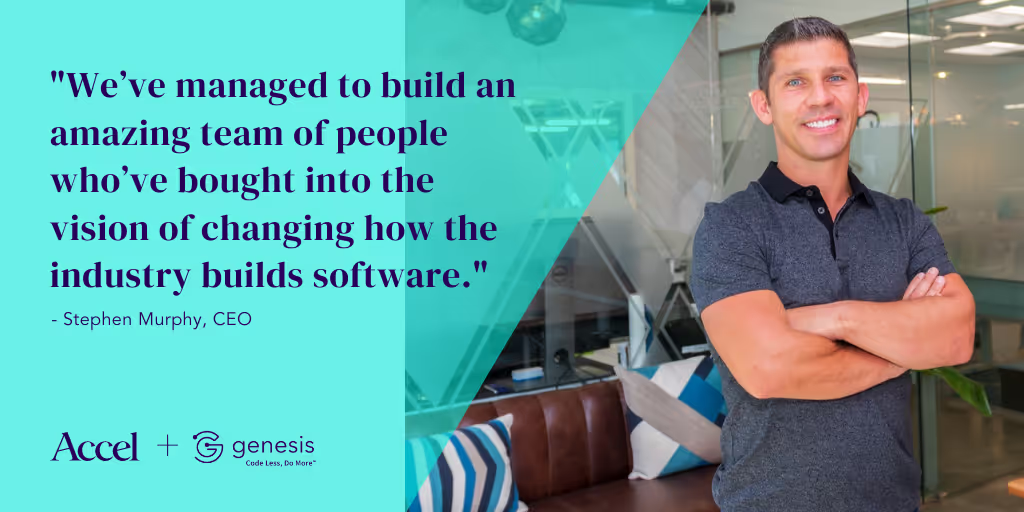Changing How We Build Software: Introducing Genesis

As the scale of enterprise automation grows, one area rapidly gathering momentum is low-code software development: Gartner estimates it will account for more than 65% of application development by 2024. Low-code isn’t just growing in prevalence, but expanding in focus. It’s moving from the outer layers of the enterprise into the complex, mission-critical systems at the heart of the world’s biggest industries. Of those industries, there’s none bigger or more complex than financial services, where IT and software spend are projected to top $500bn this year.
Software keeps the modern financial world moving – its vast transaction flows, oceans of real-time data, and endless security requirements. Yet the way that software’s developed and maintained, typically via legacy vendors and large in-house teams, is costly and inefficient.

As large financial institutions face an increasingly competitive marketplace, greater regulatory burden, and growing user demands, they’re being hindered by unwieldy, expensive, and inflexible software development processes. Enter Genesis, the brainchild of industry veterans Stephen Murphy and James Harrison. A low-code platform for financial services, Genesis gives major institutions access to a library of pre-built applications and connectors along with the capability to build and modify their own. And the development process couldn’t be more different to what these are used to. The platform combines the ease of use and flexibility of deployment with the depth and rigor to support institutional-grade requirements around latency, security, and reliability.
First-time founders Stephen and James draw on a wealth of firsthand experience and an ability to think like their customers. We’re thrilled to be joining them on the next stage of Genesis’ journey. To mark the close of our investment, we spoke to Stephen about the origins of the company, investing in four years of R&D, his advice to fellow founders and where Genesis goes next.
What was the inspiration for the business?
SM: The genesis of Genesis was that we knew there had to be a better way to build software in the financial services industry. The biggest problem was the mentality of buy vs. build. On the one hand you had very expensive vendor technologies, which were inflexible, hard to integrate and always falling behind the curve technically; then you had in-house architecture teams which were also very expensive and found it hard to keep up to speed with new developments. We’ve spent our entire careers in the industry and knew the frustrations of both approaches firsthand.
The growth of open source was the inflection point – it meant we could develop a platform and library of off-the-shelf products, from complex trading systems to simple workflows, which can then be adapted to the needs of the organization. It allows our customers to buy and build: the best of both worlds, rather than choice between two flawed options.
Where does Genesis fit in the category of low code and no code platforms?
SM: Most low-code and no-code platforms are effectively BPM [business process management] systems, focused on simple workflows. We wanted to build something for our industry, which has very specific and demanding needs: applications that can process complex events, support high transaction throughput, distribute price information at ultra-low latency and manage multiple layers of encryption, authentication and authorisation.
A BPM platform isn’t having to worry about processing 100,000 transactions a second. Our vision was to change the way the industry builds software, and we knew that required a platform with unique depth, functionality and durability.
How challenging is it as a start-up with major financial institutions as your customers?
SM: Even though we know the industry well - it’s been daunting! There are practical challenges, like the complexity of procurement when you’re dealing with major institutions. And there were hurdles in getting people not just to see the value of the product, but to get comfortable working with open source, or even to host their data on the cloud in the early days.
But ultimately, whenever a customer worried that we were too small or unproven, the product spoke for itself. And we built trust by tackling difficult problems first: proving that we could build industry-grade applications on the platform. The proof of concept being a credit insurance application for syndicated loans with ING. Once customers take a closer look, they get excited by the breadth of use cases the platform has, its ability to build complex core systems, and the library of pre-built applications they can easily integrate and adapt. They start to see how it can transform the way they implement software.
What approach did you take to developing the product?
SM: We spent four years on R&D before going to market. We had a set of functionalities we wanted to build into the platform and had to be confident it was resilient and had the depth to support complex use cases before taking it to customers.
You have to be relentless taking that approach as a lot can change in 12 months, let alone four years. But we were confident we were building something clients needed and that we were driving change rather than being carried along by it. Everyone talks about microservices now, but hardly anyone did six years ago when we started building a platform for it.
We knew it was ready to go to market once we’d built the first complex application: an equity trading platform. It proved the platform could handle what customers would require of it. The first customer use cases were quite simple ones, but the depth and variety has grown significantly since.
What advice do you have for founders on a similar journey?
SM: Stay extremely focused. You need a long term vision, but day-to-day you have to stay focused on short-term goals. I had a series of check-boxes: proving that the technology worked, proving we could work with a clearing bank, proving that we could work with a hedge fund, proving that we could do FX, insurance and wealth management.
Getting the balance right between short- and long-term is hard. You need achievable goals to stay focused, but you shouldn’t cannibalize your vision to chase revenue today. We could have grown more quickly by focusing on a single area like wealth management or equity trading, but we knew we’d be shrinking our opportunity space by not developing other use cases in parallel. Your short-term goals have to point towards the long-term mission – which is hard when you’re self-funding a company and have to think about payroll!
Most importantly, put your team first and give them a common goal. We’ve only got this far because we’ve managed to build an amazing team of talented people who’ve bought into the vision of changing how the industry builds software.
Why did you choose Accel as a partner for the next stage of growth?
SM: We’ve met some great, very supportive people at Accel who’ve helped us think about how to hyper-scale the business. They’ve really bought into our plan for the future: the way they’ve played back the opportunity we have and how we can get there has made a lot of sense. For us, it’s about working with investors who appreciate what’s been achieved, trust that we can take it to the next level, and who we trust to help us define the future path towards building a hugely successful company and changing the way the world builds software.
Finally, what’s next for Genesis?
SM: We’re going to invest more in the tooling, adding a no-code functionality so that the platform becomes relevant to different kinds of users. And we’re going to expand sales and marketing: having largely flown under the radar by design so far, we want to communicate more widely about the platform and its role in changing the financial services industry.
Longer term, we may look beyond our home market. There are other major industries with very similar problems and needs around complex core applications – manufacturing and healthcare being two examples. We know there isn’t another company doing what we’re doing with the approach we’ve taken or the functionality we can offer.
************
We’re excited to welcome Genesis to our portfolio - alongside great no code / low code companies such as Webflow, Rows, Tines, and BRYTER who are on a mission to democratise software development. Be part of the next stage of Genesis’ journey and take a look at open roles!
Great companies aren't built alone.
Subscribe for tools, learnings, and updates from the Accel community.

